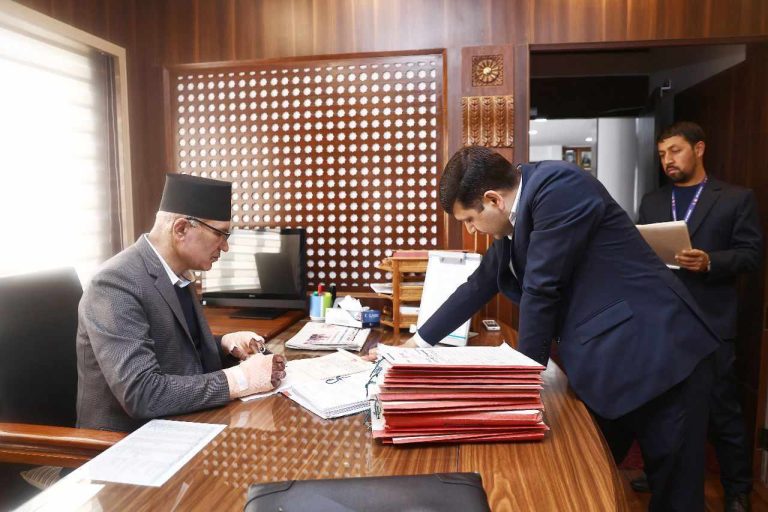As Nepal approaches the end of its fiscal year, a critical question looms large: Can the new budget help the country recover from its deepening economic crisis?
With just three months left in the current fiscal year, the government’s performance remains weak. Revenue collection is far below expectations, and public spending is equally slow. As Finance Minister Bishnu Paudel gears up to present the new budget, experts say Nepal needs more than just big numbers — it needs realistic plans.
Government Revenue and Spending Fall Short
According to official data, by the end of March, Nepal had collected only 52.62% of its projected revenue. At the same time, just 48.1% of the budgeted funds had been spent.
This poor implementation highlights a recurring problem: the government sets big goals but struggles to meet them. The situation has sparked concern about how future budgets will be planned and executed.
Minister Paudel has finished discussions with ministries and is now consulting with experts, lawmakers, and stakeholders. Still, the actual direction of the upcoming budget remains unclear.
Budget Expectations vs. Economic Reality
One of Nepal’s biggest issues is its weak revenue system. Economic growth has slowed, and the government has missed several revenue targets in recent years.
To make matters worse, foreign aid is shrinking. Major donors like the United States have cut back on support. Nepal’s inclusion on the Financial Action Task Force (FATF) grey list may also reduce loans and aid from other countries.
The National Planning Commission (NPC) has set a budget ceiling of Rs 19 trillion for the next fiscal year. This figure assumes a 12% increase in revenue. However, just months ago, the government had to revise its current budget downward by Rs 2 trillion due to shortfalls.
Economist Keshav Acharya says the government keeps making big plans without the ability to implement them.
“Despite cuts in foreign aid, the government continues to plan big. But the time has come to bring a realistic budget,” he said.
Economist Dr. Chandramani Adhikari agrees. He believes revenue can be raised by broadening the tax base instead of raising tax rates.
“There is potential for growth. We must deepen the tax net instead of increasing the burden,” he added.
Federalism, Project Planning, and the Need for Reform
To improve how projects are managed, the NPC has introduced new rules for the National Project Bank. Starting next fiscal year, only projects costing more than Rs 30 million will be listed.
This move aims to prevent the central government from handling small, local projects, which is against federal principles.
Shyam Ghimire, spokesperson for the Ministry of Finance, confirmed this update. Smaller projects may still receive funding, but under different budget categories.
However, critics say the central government is still interfering in local matters. The federal budget continues to reduce fiscal equalization grants, which are vital for provinces and local units to function independently.
“The current administration has shown no intention of deepening fiscal federalism,” says Acharya.
“The rhetoric of decentralization is strong, but the actual practice is the opposite.”
Dr. Govinda Nepal adds that slashing these grants after local budgets are approved leads to a mismatch in spending and available funds.
Capital Spending: A Persistent Weakness
For years, Nepal has struggled to spend its capital budget — the funds meant for infrastructure and development. On average, only about 65% of this budget is used each year.
Dr. Nepal says poor project management and weak institutions are to blame.
“The government must build its capacity to spend, not reduce capital expenditure. If funds are allocated but not used, development suffers,” he warns.
Problems like political pressure, uneven priorities, and delays in procurement continue to slow down progress.
Is the Social Security System Sustainable?
Social security is one of the government’s largest spending areas. Last year, Rs 108.8 billion went toward social allowances. However, the current system gives the same benefits to everyone, regardless of income or need.
Acharya believes this is not sustainable.
“With a robust database and targeted distribution, the government could save Rs 30 to 40 billion,” he says.
But due to political sensitivity — especially with rising royalist voices — reforms may not happen soon.
Dr. Nepal adds that the number of beneficiaries will only grow unless major changes are made.
Will Civil Servants Get Another Raise?
Government workers are hoping for another pay hike, especially after a 15% increase in last year’s budget. But experts say the current financial crisis makes this unlikely.
“The government can’t even cover existing operational expenses. Increasing salaries without reducing staff or offices will only add pressure,” says Dr. Nepal.
Acharya adds that reform is essential if pay hikes are to be considered in the future.
Health and Education Still Struggling
Nepal’s Constitution guarantees free health and education. But both sectors are underfunded and poorly managed.
Teachers are protesting due to unmet promises. The Free Education Act remains unimplemented. Health institutions are owed over Rs 12 billion under the national insurance plan.
More than 300 local hospitals are under construction but have stalled due to funding issues. Some contractors have not been paid for completed work.
Dr. Nepal believes the problem isn’t the amount of money, but how it’s used.
“We must manage our existing investments better. In education, demographic shifts due to migration must guide reforms. In health, it’s all about smarter management,” he explained.
A Budget of Realism, Not Rhetoric
As Nepal inches closer to a new fiscal year, the next budget could shape the country’s economic path. But experts warn that without honest planning, better execution, and real reforms, the cycle of poor performance will continue.
The Finance Ministry has a chance to turn things around. Whether it will seize that opportunity remains to be seen.


